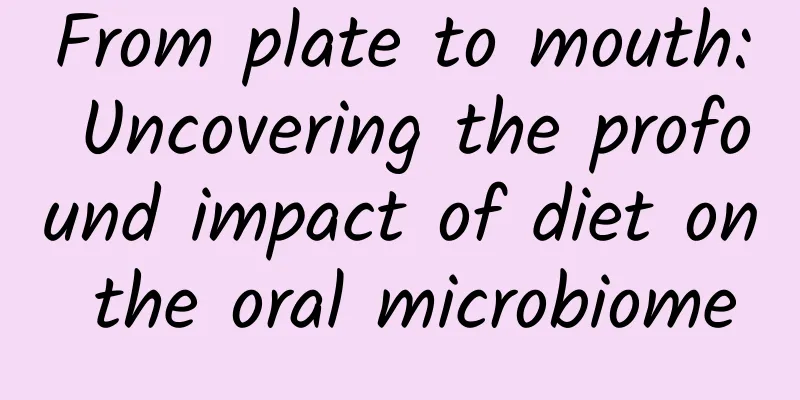From plate to mouth: Uncovering the profound impact of diet on the oral microbiome

|
Imagine that every time we chew food, we are also providing nutrients to the micro-ecosystem in our mouth. In our mouth, there are hundreds of millions of microorganisms, which constitute the complex oral microbiome ecosystem. This microscopic world is like a busy city, with different microorganisms playing their respective roles to maintain a healthy balance in the mouth. In recent years, scientists have paid more and more attention to the impact of diet on this microscopic world. The latest research shows that our eating habits not only affect the health of the whole body, but also have a profound impact on the composition and function of the oral microbiome [1]. 1. What is the oral microbiome? The oral microbiome refers to all microbial communities present in the human mouth, including bacteria, fungi, viruses, etc. This complex ecosystem plays a key role in maintaining oral health and preventing diseases. Just like different species in a forest, the various microorganisms in the mouth interact with each other to form a dynamic equilibrium system[2]. 2. Relationship between diet and oral microbiome 2.1 Effect of sugar Imagine the mouth as a small ecosystem, with sugar being like fast food for certain bacteria. Several studies have shown that a high-sugar diet leads to an increase in the number of acid-producing bacteria in the mouth, such as Streptococcus mutans. These bacteria are like greedy little monsters that quickly digest sugar and produce acid. These acids erode tooth enamel, just like acid rain erodes limestone, ultimately increasing the risk of tooth decay [3]. 2.2 Effects of dietary fiber Dietary fiber is like "fertilizer" in the oral ecosystem. A diet rich in dietary fiber can promote the growth of beneficial bacteria. For example, a study published in "mSystems" found that increasing whole grain intake can increase the abundance of Prevotella in the mouth, a type of bacteria that is positively correlated with oral health [4]. Just like planting more scented mint in the garden, it helps to enhance the fragrance and also helps to repel mosquitoes. 2.3 Effects of protein and fat Protein and fat intake also affect the oral flora, just as different foods attract different animals. A high-protein diet may increase the number of bacteria that produce volatile sulfur compounds, which are associated with bad breath. Think of these bacteria as running a small chemistry experiment, converting protein into less pleasant gases. Omega-3 fatty acids may help reduce periodontal inflammation, like a protective film on the oral ecosystem [5]. 3. Long-term effects of dietary patterns on the oral microbiome Long-term dietary patterns will shape the overall structure of the oral microbiome, just as climate affects the distribution of vegetation in a region over the long term. For example, a study in Nature Communications compared the oral microbiomes of vegetarians and meat eaters and found that vegetarians had fewer bacteria associated with inflammation in their mouths [6]. This is like two different ecological environments creating two different microbial and animal populations. 4. Potential for dietary intervention Understanding the relationship between diet and the oral microbiome could open up new avenues for oral health interventions. This is like a gardener learning how to grow healthier plants by adjusting the composition of the soil. For example, supplementing with probiotics or prebiotics may help regulate the balance of oral flora. A study published in "Frontiers in Microbiology" showed that specific lactic acid bacteria preparations can inhibit the growth of bacteria that cause tooth decay [7]. This is like introducing natural enemies into an ecosystem to control the number of harmful species. 5. Future research directions Although we already know the importance of diet on the oral microbiome, many specific mechanisms remain to be elucidated. Just as we already know that climate change will affect the ecosystem, more research is needed to understand the specific mechanisms of influence. Future research may focus on: I. Effects of individualized dietary advice on oral health II. How specific food components regulate oral microbial metabolism III. Association between oral microbiome and systemic health Finally, our dietary choices not only affect our overall health, but also change and reshape our oral microbial ecosystem. Just as we nourish ourselves with food, we are also changing the microbial "residents" in our mouths. By understanding and adjusting our eating habits, we can better manage oral health and prevent oral diseases. In the future, personalized dietary recommendations based on oral microbiome research may become a new frontier in oral medicine, just as ecologists develop conservation strategies for specific ecosystems. |
<<: A must-read for lung cancer patients: How to choose the right treatment plan?
>>: Is refrigerated yogurt better than room temperature yogurt?
Recommend
Understanding in one article: Multidisciplinary comprehensive treatment of chronic kidney disease-related pruritus to improve patients' quality of life
World Kidney Day is a global awareness campaign a...
Is it really good for women to eat coriander?
I believe everyone must be very familiar with cor...
How can women replenish their kidneys the best and fastest?
Many people think that men need to nourish the ki...
What does it mean when a girl's lips turn pale?
Girls are particularly concerned about their imag...
How to provide psychological care for women during pregnancy and childbirth
More and more expectant mothers and new mothers w...
"I have breast cancer? But I'm a man!"
Expert in this article: Shi Libin, Director of th...
How long does it take to fart after a cesarean section
There are two ways of delivery: caesarean section...
Can baking soda be used to clean vulvar itching?
Women often experience vulvar itching. The vulva ...
I really want to ask: My partner has a very loud voice, will it damage my hearing?
Have you ever encountered a situation where someo...
Is it good to induce labor at 39 weeks of pregnancy with low amniotic fluid?
At 39 weeks of pregnancy, you have entered the la...
I popularize science, you listen | Factors that affect adolescent mental health
Your browser does not support the audio tag Q: Th...
What should I do if I always suspect that I am sick? How can I relieve tension during the epidemic?
On February 10, the State Council Joint Preventio...
Identifying different types of anemia, these test indicators are key
Author: Wang Xuejing, Chief Physician of Civil Av...
Can royal jelly be applied on the face?
Honey is a very good food. People often use honey...
Understand Parkinson's disease, know "Parkinson" and don't be afraid
Author: Liu Na, deputy chief physician, Peking Un...









